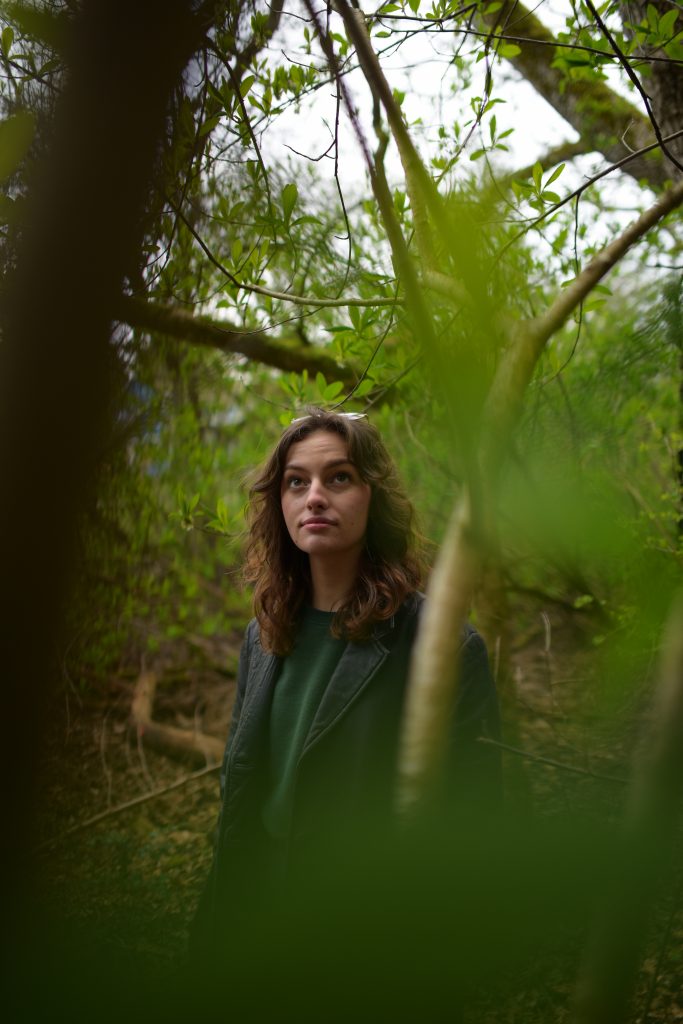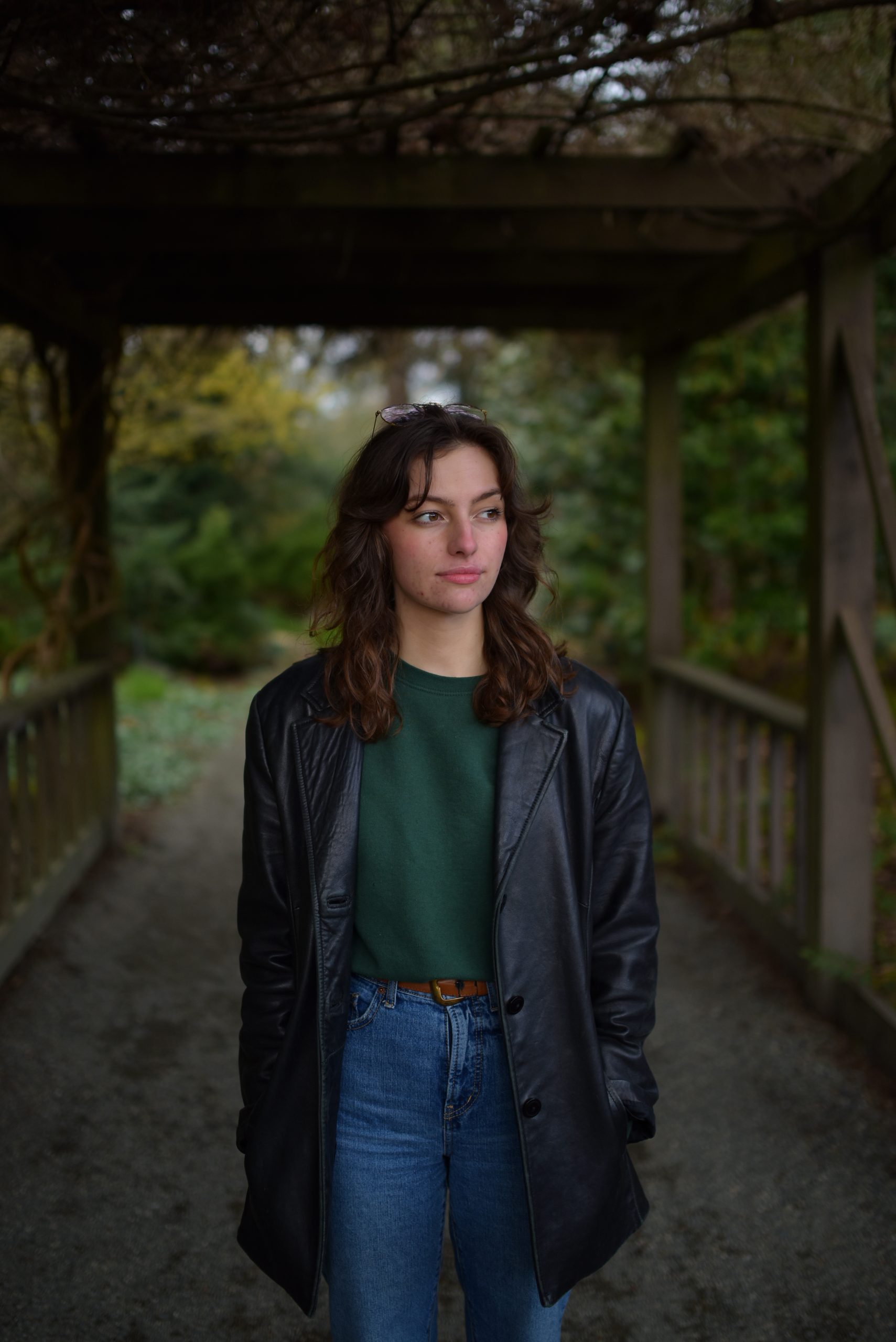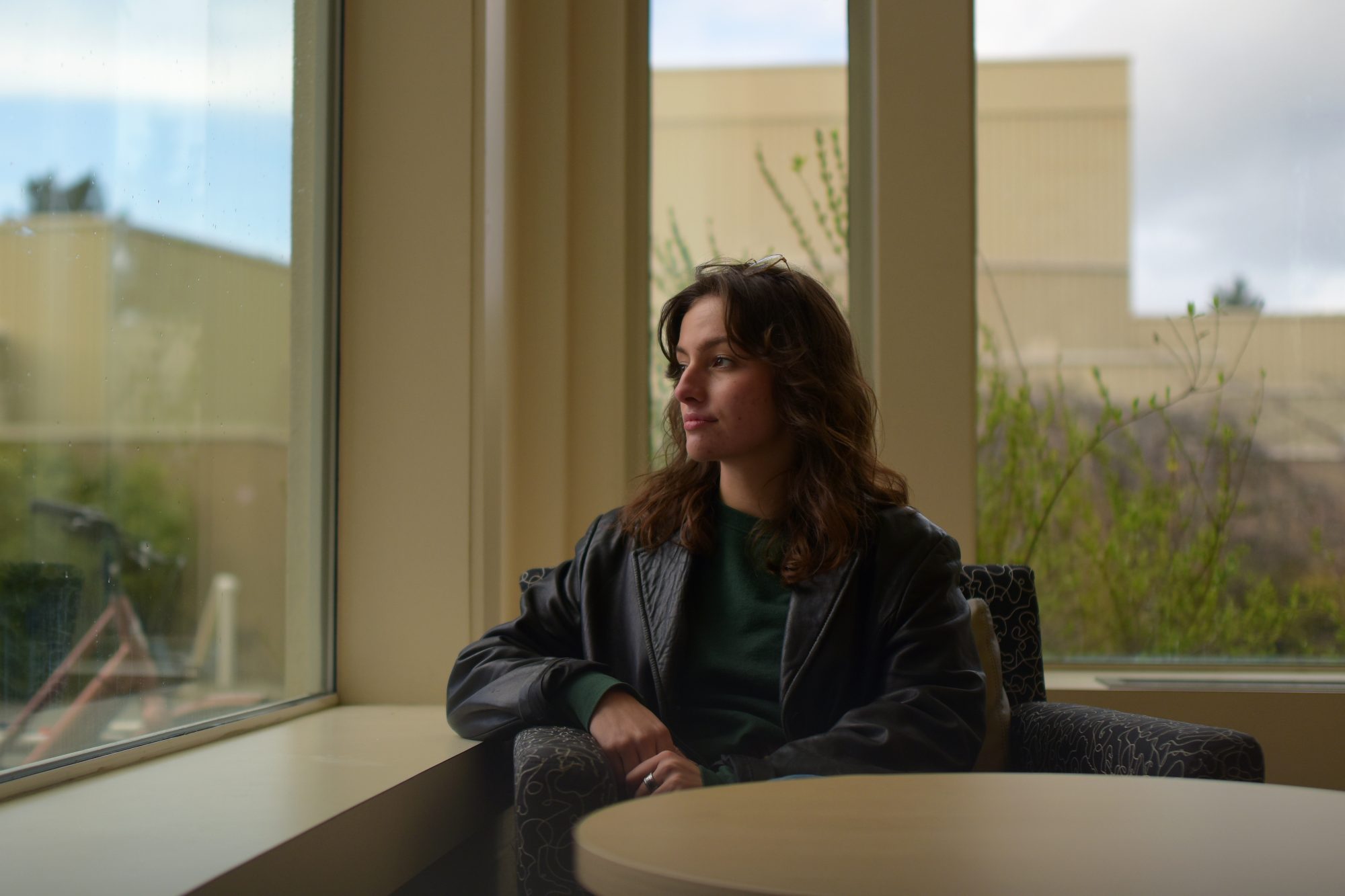Living climate change is a series of personal stories from university students in British Columbia who have lived through climate-related emergencies and disasters.
by Kennedy Halwa, as told to Melody Powers
Photos by Phil MacLachlan
Kennedy is a writing student at the University of Victoria, focusing on creative non-fiction. She is from Sylvan Lake, Alberta, a small lake town south of Edmonton that is busy with tourists in the summer. Before pursuing writing, Kennedy had trained as an actor, dancer and singer, and was supposed to go to Red Deer Polytechnic for a bachelor of applied arts in film, theatre and live entertainment. The program was suspended two days after her interview for the school, something Kennedy now feels was a blessing because Victoria, British Columbia has given her more opportunities to grow. But, during Canada’s record-breaking 2023 fire season, she was back at home working two summer jobs: one at a baseball park and the other at a lakeside go kart and mini golf place.
I remember opening the front door every day to go work and getting an overpowering smell of campfire. There was such a deep orange glow that comes from it, how it just carries over and fogs over the whole day, you can’t see the sun at all. The sky just blends into the ground and the horizon because it’s so foggy and smoky. It was very apocalyptic and surreal. It just felt fake.
Even just seeing little grey and white black specks all over the front steps and on the front of my car. I would turn on my windshield wipers and spray them down for 20 seconds just to get the ash to stop smearing all over so I can drive.
My co-workers and I would text each other in the mornings like, “Are we even allowed to be working? Should we even open? Because this isn’t safe for any of us. It’s not safe for the customers.”
At the go kart place, I would see the dust settling on the karts. In the more severe times, we would take cloths to our arms and legs, and just see the ashes come off, even if we had been outside for an hour. The ashes feel weird and gritty. It has a dry feeling on your body. You just feel so dirty, and want to wipe it all off as fast as you can. Some days I would wear masks, but the customers couldn’t understand you.
The health effects of wildfire smoke
It was just so wild to see how the smoke affects your health and gives you headaches. In 2017, I had bilateral pneumonia, which may have been caused by the B.C. wildfires.
I took a trip to Shuswap Lake with my best friend, when I got back my family doctor told me I had the flu. My family and I went camping after and I was struggling to drink or eat, I had no appetite. I spent most days in the trailer; I had no energy.
After two and a half weeks passed we went to a very small urgent care in Slave Lake, near where we were camping. Within seconds of the doctor listening to me breathe, they immediately hooked me up to oxygen and an IV tube, and were talking about airlifting me down to Edmonton. I was 16-17 at the time.

My mom saw the MRIs while I was playing Uno with my dad. She said my lungs lit the fuck up like a Christmas tree. It was very wild. I had very healthy and strong lungs. I’ve done a lot of theatre, dancing and singing, so I needed that lung power. After, I tried doing cross country and I barely made it. I had to have a puffer for a while. I felt so defeated.
With that, the fires this summer affected my lungs. They were just very sore and I was coughing a lot. But aside from my health, it’s very overall anxiety inducing. One day we drove to Edmonton to go see a dinner theatre with my aunt. As we were driving there were a lot of fire warnings and a fire to the west of Edmonton. As we got closer to the city evacuation warning notifications popped on her phone. I’m like, “Mom, should we be going?” and she’s like “The city is fine. The city is okay.”
“When we were kids, “if you had to pack up and you could save three items, what would they be?” used to be an icebreaker question, but now it’s a genuine possibility.”
— Kennedy Halwa
It was 11:30 p.m. as we were driving home. It was dark for the summertime. As we got to the highway, you can see sparkling red all along the sides of the highway and the ditches. I’ve never had such a close experience with a wildfire. It’s weird to think about how if the wind had even just taken it a little bit more south of Edmonton our town could have lost it all.
“It could be us next”
And when that comes, what are we going to bring, and where are we going to go? When we were kids, “If you had to pack up and you could save three items, what would they be?” used to be an icebreaker question, but now it’s a genuine possibility. That says something about growing up and losing that naivety. It’s just coming to terms with the fact that the world is not the same when we were young. Temperatures are rising, trees are burning, people gotta leave, and it could be us next. That’s the worst case scenario, but it could also very well be a reality with the way the world is going, and the way climate is changing.

“I don’t see the damage every day, but I can feel the damage.“
In August, when I was driving back to Victoria with my parents, I think around Kamloops, we saw some helicopters with the bags of water, carrying it wherever they needed to. It was going right above us. It was weird to think about how I’m just trying to get back to school, back to my second half of my home, while others are still running around to save theirs.
There was a point where we were worried that we were going to have to delay coming back because of all the fires. I kept thinking, “Am I going to make it back for class?” It was wild that that was one of my big thoughts. I’m grateful we were able to safely make it here, and my parents were able to safely make it back, but it was very surreal.
I haven’t yet been back to Edmonton since we drove past, and I won’t see Kamloops until spring. So I’m not constantly reminded by the fires. I understand it’s a privilege that I don’t see the damage every day, but I can feel the damage. It’s just not in my eye line every day.
This testimony was co-created by members of the Climate Disaster Project at the University of Victoria. The project is an international teaching newsroom that works with disaster-affected communities to document and investigate their stories. For more information, please visit www.climatedisasterproject.com.
